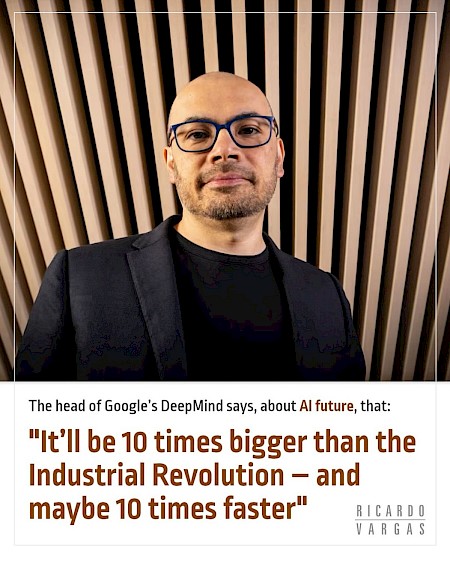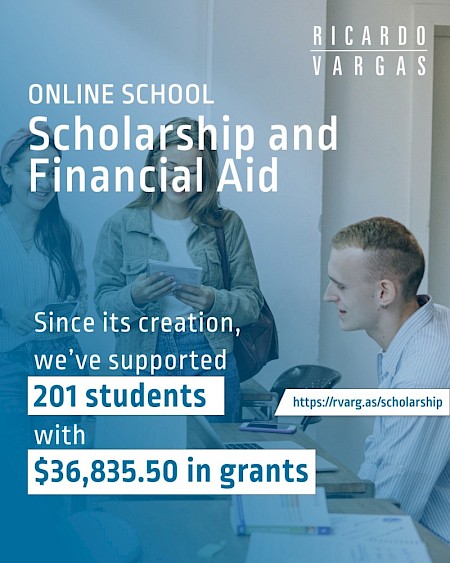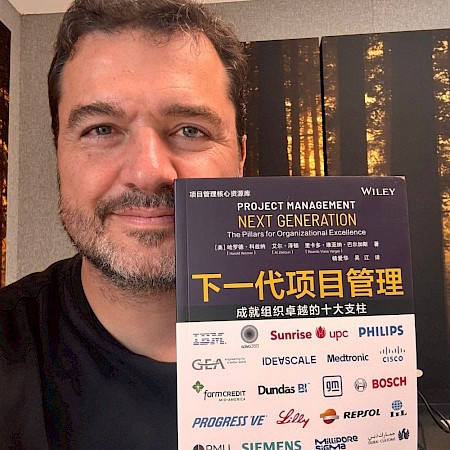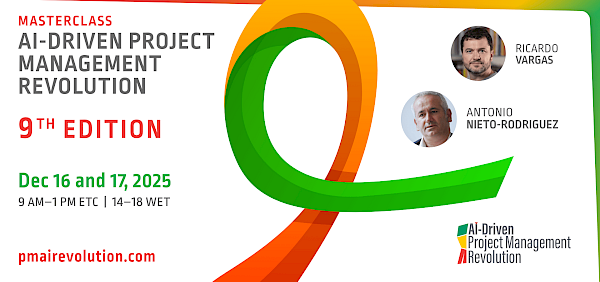Issue #22 - Trabalhando na praia?
Olá pessoal
Estou de volta com uma nova edição da nossa newsletter — desta vez explorando o que acontece quando trabalho, vida e localização colidem. Das lições que os nômades digitais podem nos ensinar sobre como executar projetos em diferentes fusos horários (ou sem eles) à ascensão de agentes de IA que trabalham como verdadeiros parceiros, vamos mergulhar nas tendências que estão remodelando a nossa forma de liderar.
Desvendaremos as novas regras da Lei de IA da UE, destacaremos as principais conclusões do Relatório Pulse de 2025 do PMI e exploraremos ideias ousadas de pioneiros da IA como
Demis Hassabis. Além disso, compartilharei minhas ideias sobre o ChatGPT-5, celebrarei um marco em nosso programa de bolsas de estudo e darei uma olhada nos bastidores dos meus projetos mais recentes do LinkedIn Learning.
Há muito aqui para inspirar novas ideias — esteja você na praia, no escritório ou em algum lugar entre os dois.
Boa leitura!
Ricardo

In This Issue
- What Digital Nomads Can Teach Us About Managing Projects Without Time Zones
- From Prompts to Partners: The Rise of ChatGPT Agents
- The EU AI Act just went into effect with a very clear message
- Lessons from PMI’s 2025 Pulse Report
- Demis Hassabis: AI’s Impact Could Surpass the Industrial Revolution
- ChatGPT-5 Is Here: Faster, Smarter… and Stirring Debate
- A LinkedIn Day in Austria
- Scholarship Program hits an incredible milestone
- New Course reminder: Earned Value
- My book has been published in Chinese!
- New Masterclass dates: don't miss it!
What Digital Nomads Can Teach Us About Managing Projects Without Time Zones
We all know August is a time for vacations, slower inboxes, and maybe a bit more gelato than usual.
So, for this month’s newsletter, we’re keeping it light — but still inspiring.
Because while many are taking a well-deserved break, there’s a quiet revolution reshaping how we work, travel, and manage teams.
If you’ve been scrolling through LinkedIn or Instagram lately, chances are you’ve seen someone leading a team meeting from a café in Lisbon or replying to Slack messages from a hammock in Bali.
At first glance, it may look like a cliché or a travel influencer’s latest gimmick.
But this is not just a lifestyle trend.
It’s a tectonic shift in how we work. Project management is evolving.
Although remote work skyrocketed during the pandemic, what’s surprising is that it hasn’t gone away.
Instead, it has matured. It’s evolved into something more deliberate, more structured, and in many cases, government-backed.
In fact, according to a 2024 report by Forbes, over 50 countries now offer digital nomad visas, designed to attract remote professionals and entrepreneurs. Portugal, Estonia, Costa Rica, and even countries like the UAE are offering packages that blend work flexibility with strategic economic development.
Building on this momentum, 2025 has seen even more nations join the movement. South Korea and Italy have both launched digital nomad visa programs this year, aimed at welcoming remote workers with high skill levels and stable incomes.
Remote work is no longer just a response to a crisis. It’s become a talent magnet strategy.
And at the center of this transformation?
Professionals who manage projects, build products, and lead cross-border teams.
The traditional project meeting, Tuesday at 9:00 AM, feels old-fashioned when your backend developer is in Chiang Mai, your designer is in Buenos Aires, and your client is in Berlin.
The solution isn’t to force everyone onto Zoom at midnight.
The solution is asynchronous collaboration.
This is where tools like Slack, Notion, Loom, GitLab, and Asana become mission-critical.
But it’s not just about the tools.
It’s about how we communicate, what we document, and how we lead when “real-time” becomes the exception, not the rule.
According to Atlassian’s State of Teams research, back‑to‑back meetings are one of the leading causes of burnout — 76% of knowledge workers report feeling drained on heavy-meeting days, and 51% say meetings force them into working overtime.
Teams that replace non-essential meetings with asynchronous communication don’t just increase efficiency — they reclaim focus time and breathing room.
Async work respects time, energy, and flow.
There’s also a romanticized idea that remote work equals leisure.
That working remotely, especially from “exotic” locations, is somehow cheating the system.
That could also be one of the reasons why some companies schedule meeting after meeting. They want to have control.
But let’s be very clear:
Remote work ≠ not working.
And working from the beach doesn’t mean you’re on vacation.
In fact, most digital nomads I’ve met work more intensely than their office-bound counterparts.
The only difference?
They’ve optimized their environments for focus, freedom, and flexibility.
And the beach is also a metaphor. A symbol of work that’s location-independent, autonomy-driven, and trust-centered.
And this requires a different kind of project management.
It would be naive to think that managing remote-first or location-independent teams is all sunsets and Slack channels.
It’s not.
There are serious compliance and legal implications to global work that project managers and PMOs must stay ahead of:
- Labor laws & tax residency: Just because someone logs in from a different country doesn’t mean your legal exposure disappears.
- Health insurance and liability: If a team member gets sick in another country, are they covered?
- Data privacy: GDPR and similar regulations have teeth, and where your team is working can change the rules you’re bound to.
- Cybersecurity and IT logistics: How do you secure devices across geographies? Who handles hardware failures? What’s the backup plan?
Global work is no longer a niche scenario, it’s the new standard. And with it comes a new set of responsibilities.
As more professionals seek out freedom and flexibility, and as countries roll out red carpets for skilled digital workers, project managers will need to adapt.
We’ll need to design systems that operate across jurisdictions, across cultures, and across time.
We’ll need to think more about inclusivity, accessibility, and equity in the way we run projects, because asynchronous work can just as easily exclude as include, if not done right.
We’ll also need to ask tough questions:
- How do we onboard people in this new async world?
- How do we foster real connection when the team never shares an office?
- How do we lead when we’re not “seeing” the work every day?
I wrote this while working a few feet from the sea, the sun setting behind my screen.
I’m living a reality that many of us are slowly stepping into: A world where location is fluid, collaboration is asynchronous, and leadership is global.
Digital nomadism isn’t just a trend. It’s a lens into the future of project management.
We are no longer managing hours. We are managing clarity, outcomes, and trust.
Let’s not resist the shift.
Let’s lead it.
What Has Been on My Radar Recently?
From Prompts to Partners: The Rise of ChatGPT Agents
If you haven’t explored them yet, this isn’t just about prompting anymore, it’s about delegating.
These agents can remember, reason, and operate across complex workflows, turning instructions into action over time.
We’re no longer talking about simple task automation; we’re looking at dynamic collaborators that can plan, adapt, and execute.
In the recent webinar series I hosted with Antonio Nieto-Rodriguez — Webinar Series Revolutionizing Projects — we reflected on how this changes the very DNA of project management.
When an agent can schedule meetings, prioritize tasks, flag risks, and even synthesize lessons learned, it doesn’t just save time. It forces us to rethink what “management” actually means.
We’re entering a phase where AI isn’t just a tool. It’s a partner.
The EU AI Act just went into effect with a very clear message
As of August 2nd, the European Union’s AI Act is now in effect
General-purpose AI models like ChatGPT, Claude, and Gemini are now subject to a new regulatory framework, aimed at setting the boundaries for transparency, safety, and responsibility.
In Monday’s 5 Minutes Podcast episode, I unpacked what this means for professionals leading AI-driven projects you can listen here.
It’s more than just compliance. It’s a moment of responsibility.
The regulation introduces risk classifications, new transparency obligations — and a growing tension between the pace of innovation and the need for oversight. Some fear it may slow down progress. Others believe it’s the only path to building sustainable trust.
For those of us building with AI at the center, the landscape isn’t just shifting.
It’s asking something of us.
The real question is: Are we ready to evolve with it?
Lessons from the PMI’s 2025 Pulse Report
The latest PMI Pulse of the Profession 2025 report highlights something essential for every project professional: Business acumen is no longer optional, it’s a critical differentiator.
Today’s dynamic and complex landscape demands that project professionals do M.O.R.E., moving beyond managing scope, budget, and schedule toward driving strategic value.
The report reveals:
- 66% of project professionals have moderate business acumen proficiency
- Only 18% demonstrate high business acumen proficiency
- And 16% fall into the low proficiency category
What does this mean? It means there’s a clear gap and a huge opportunity.
True business acumen transforms you from a tactical troubleshooter into a strategic value creator.
It empowers you to elevate projects by aligning outcomes with broader organizational goals and measurable business impact.
Investing in developing this skill isn’t just about professional growth. It’s about reshaping how projects succeed in a rapidly-changing world.
For those of us leading projects, the question is: Are we prepared to shift from delivering outputs to creating lasting value?
The full Pulse Report 2025 is worth a read for anyone looking to meet today’s unique demands and truly revolutionize their project success.
Demis Hassabis: AI’s Impact Could Surpass the Industrial Revolution

A few days ago, I read a fascinating interview with Demis Hassabis in The Guardian.
He suggests that AI’s impact could be 10 times bigger and arrive 10 times faster than the Industrial Revolution.
Hassabis, head of DeepMind and creator of AlphaFold (the breakthrough that helped win a Nobel Prize), speaks with both excitement and caution.
He admits he wishes the rollout of AI had been slower and more controlled, but now that the acceleration is here, he calls for us to harness it responsibly, ensuring equity, foresight, and purpose guide the way.
It’s a thought-provoking reminder: powerful tools can shape the future for better or worse, depending on how we choose to use them.
Read the full interview here.
ChatGPT-5 Is Here: Faster, Smarter… and Stirring Debate
OpenAI has released ChatGPT-5, calling it its most powerful AI model yet. It introduces real-time “routing,” switching automatically between quick responses and deeper “thinking” mode depending on the task. The promise: better accuracy, reasoning, and coding skills, plus a more natural conversation flow.
But the launch hasn’t come without controversy. Some users miss GPT-4o’s style and consistency, while others have noticed glitches and strange outputs. OpenAI has acknowledged the issues and says improvements are already in progress.
It’s a bold step forward — and a reminder that every leap in AI comes with both excitement and growing pains.
Read more about the launch here.
Quick Announcements
A LinkedIn Day in Austria
I often get messages asking me to share more about my daily life: how I work, how I record courses, how I organize everything, and what a “day in my life” really looks like.
So let me confess something: I don’t like sharing my personal life online.
Yes, I post a lot — almost every day — because I genuinely enjoy delivering value to you. Social media is a powerful tool for connection, and it’s an essential part of my work.
But when it comes to showing the behind-the-scenes of my daily life… that’s a challenge. I like to maintain a balance between what I share and what I keep just for myself.
Still, I don’t want to disappoint you. So...
I recorded a short video during my recent trip to Graz, Austria, where I was filming new courses for LinkedIn Learning:
It felt like the perfect opportunity to take you behind the scenes for a moment.
Most people only see the final product — a small screen with me speaking. But behind that little window, there’s a full production setup: lights, cameras, teleprompters, retakes... and lots of focus and teamwork.
A huge thank you to Guzmán Huerta Pérez, Teresa Costa Alves, Violeta (Violeta Lenz) Puerta Cano, Carlos Diaz-Wegerer, and Andrés de la Torre. You made it all happen!
I can’t wait to share the content we’ve been working on. Some exciting new courses are on the way, and I think you’ll find them super valuable.
Stay tuned... there’s more to come!
Scholarship Program hits an incredible milestone

I ended July with one of my favorite announcements: We hit a major milestone in a project that’s deeply close to my heart, our scholarship program!
In July alone, we awarded 21 new scholarships, bringing our total to 201 scholarships granted to professionals from 53 countries, with over $36,000 USD in donations provided through this initiative.
This program has grown into a powerful vehicle for global empowerment. Today, the average age of our scholarship recipients is 36 years, a clear reminder that learning and growth have no expiration date.
Among these incredible individuals are 49 women and 152 men, each with unique dreams, challenges, and stories of resilience.
And let me be very clear about one thing: These scholarships are not a personal donation, they are possible because of you.
Every time you enroll in one of our courses, a portion of that revenue goes directly into funding this program. When you invest in yourself, you're also helping someone else access the opportunity to grow, thrive, and transform their future.
Scholarship applications are open year-round. If you or someone you know could benefit, learn more and apply here.
As we move forward, I remain committed to expanding this initiative and reaching even more learners around the world.
Thank you for being part of this mission. Together, we are changing lives.
New Course Reminder: Earned Value
I just wanted to remind you that it’s been almost 2 months since I launched a new course on Earned Value Management, one of the most powerful (yet often misunderstood) tools in project management.
It's a topic I care deeply about — it’s the focus of my master’s thesis and much of my real-world work with infrastructure and construction teams.
In the course, I try to take a very hands-on and honest approach.
You’ll learn how to apply EVMS using tools like Microsoft Project and Monte Carlo simulations, how to forecast more accurately, and how to make smarter decisions based on the right indicators — whether you're working with predictive, agile, or hybrid approaches.
The course is in English, with subtitles in Portuguese, Spanish, French, Arabic, and Simplified Chinese.
You can check it out here.
There are also four free classes on my YouTube channel if you’d like to get a taste before signing up:
My book has been published in Chinese!

After months of hard work, my latest book, Project Management Next Generation, has just been published in Chinese!
This achievement was made possible through a fantastic collaboration with many people and organizations, including Wiley, PHEI (Publishing House of Electronic Industry), and several outstanding professionals.
Could not be happier to see this work reaching even more readers around the world!
New Masterclass dates: don't miss it!
We are pleased to announce that the next edition of our AI-Driven Project Management Masterclass will take place on December 16–17, 2025.

In two intensive 4-hour sessions, you will explore the complete AI Project Life Cycle, learn practical tools and techniques, examine real-world case studies, and create a personalized action plan to confidently lead AI-driven projects.
Designed by practitioners for practitioners, this masterclass is trusted by leading organizations such as Amazon, Google, GSK, and Boston University, and has already equipped more than 400 professionals from 45 countries with the skills to integrate AI into project management effectively.
Registration will be made available soon here.
Secure your spot and join us in shaping the future of project management.
Your Voice Matters!
You can also read the previous issues here.
If you have any suggestions, comments, or anything else that will help me make it better, please send a note to [email protected]
Please feel free to share this newsletter with your friends, colleagues, and other people you may find will benefit from it.
They can also subscribe to receive it here.
Thanks for your support, and I hope it was helpful to you.
Cheers,
Ricardo Vargas



